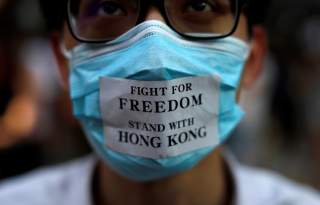The Entire World Knows That Protester Was Shot in Hong Kong
Beware Beijing: Everyone is watching you now.
Key point: The world is watching the protests in Hong Kong and Beijing knows everyone is keeping an eye on it.
Hong Kong protests turned violent as demonstrators took to the streets on Tuesday, the day marking the 70th anniversary of Communist Party rule in China.
And, for the first time since protests began early this year, a Hong Kong police officer shot and wounded a protester amid a skirmish between the demonstrators and security forces. Video of the shooting spread quickly on the internet. Thankfully, the student is stabilized.
The shot itself represented the sharpest uptick in violence since the protests began. But Monday night’s protests were also among the more violent and stood in sharp contrast to what have been, thus far, largely peaceful efforts to ensure the long-term preservation of fundamental freedoms in Hong Kong.
The police official who fired the shot claimed self-defense, saying that he thought his life was in danger. The shot was reportedly fired amid a standoff in which protesters allegedly hit security officials with metal pipes, while others are said to have swarmed, tackled, and beat up another riot officer.
In addition to that incident, many news agencies reported an overall uptick in violence, with protesters throwing gasoline bombs in subway stations, throwing rocks at windows, and damaging private property.
Regardless of the circumstances that led to the 18-year-old student protester getting shot, though not fatally, many in Hong Kong and the international community will see this as a clear-cut case of police brutality and a misuse of force.
Hong Kong’s “shot heard around the world” will hopefully lead the special administrative region’s authorities to finally undertake an independent inquiry into police brutality. That’s something that protesters have made repeated requests for and clearly the thing that could best calm the situation.
Demonstrators first took to the streets earlier this year in response to the Legislative Council’s proposed extradition bill, which, if passed, would have permitted individuals to be extradited to China at Beijing’s request.
The proposed bill—which was tabled and then later fully withdrawn by Hong Kong’s chief executive, Carrie Lam—posed an existential threat to the rule of law there.
The withdrawal of the bill was a notable success for protesters, but came at the 11th hour and was perceived as too little, too late by many in Hong Kong. In spite of the bill’s withdrawal, protests continued. And as demonstrations continued, demands grew.
While, initially, protesters simply wanted the extradition bill fully withdrawn, their demands have since increased from one to five. They now include a call for an independent inquiry into police violence, amnesty for all protesters, universal suffrage, and a request that protests not be referred to as “riots.”
Some have also called for the removal of Lam from office.
The U.S. should continue to be supportive of peaceful protests and urge restraint on both sides.
Violence is rarely an effective way to secure liberty, and protesters who have taken to the streets in defense of the rule of law and freedom do their cause a disservice by flouting the rule of law themselves.
The international community should also send an unequivocal signal that it will not tolerate police brutality in Hong Kong. It could do so by supporting calls for an independent inquiry into the conduct of security forces.
There have been a number of instances over the past several weeks and months in which protesters sustained serious harm at the hands of the Hong Kong security forces. It’s a complicated situation, and the emotions at play are intense.
Whatever the events that have led to the current impasse between protesters and police, however, the reputation of the police must be restored.
It is difficult to see how that happens without systematically and independently addressing the grievances that have accumulated since the protests started.
This article by Olivia Enos originally appeared at The Daily Signal. This article first appeared in 2019.
Image: Reuters

